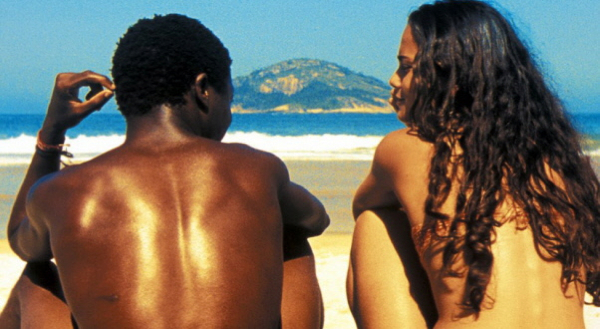Movie review by Greg Carlson
Like Alejandro Gonzalez Inarritu’s stunning “Amores Perros,” “City of God” embraces a sensational cinematic style – a tour de force of editing and camerawork complete with dizzying 360-degree tracking shots, split screens, handheld cinematography, bullet-eye-ricochets, and non-chronological storytelling. These moviemaking pyrotechnics are well-suited to the subject matter, an adaptation of a popular novel by Paulo Lins that chronicles the bleak fate of the inhabitants of Cidade de Deus, a government-sponsored housing project in Rio de Janeiro. Narrated by Rocket (Alexandre Rodrigues), a kid who sees news photography as his only way out of the ghetto, “City of God” is as beautiful as it is harrowing.
Co-directors Fernando Meirelles and Kátia Lund smartly cast nearly every role with a non-professional (many of whom live in Cidade de Deus), and the result is a lean authenticity that merges fact and fiction, myth and reality. Because so many of the movie’s characters are young men pretending to be something or someone they are not, the performances appear effortless. Rocket, whose sweet nature and desire to avoid becoming a hood position him as an ideal observer, takes the audience back to the beginnings of major criminal activity in his world, when his older brother and two friends (who form the “Tender Trio”) graduate from holding up propane trucks to robbing a brothel.
Also involved in the brothel stick-up is Li’l Dice (Douglas Silva), a younger tag-along who turns out to be incredibly dangerous – both to his “friends” and to anyone he perceives as standing in his way. “City of God” jumps around in time, and Li’l Dice grows up to become Li’l Ze (the older version of the character is played by Leandro Firmino da Hora), a full-blown psychopath ready to kill over the tiniest provocation. Only Ze’s closest friend Benny (Phellipe Haagensen), an easy-going and likable hippie-type, manages to keep the cold-blooded enforcer in check.
Benny quickly emerges as one of the movie’s most charismatic figures. It nearly breaks your heart that this smart, kind-hearted teenager is just as comfortable around handguns and cocaine as he is hanging out at the beach and cuddling with his gorgeous girlfriend. Benny’s fateful decision to try to leave Cidade de Deus culminates in one of the film’s most dazzling sequences: a giant, strobe-lit, farewell dance party so packed with volatility and emotion the tension borders on unbearable. Even Carl Douglas’ goofy disco anthem “Kung Fu Fighting” manages to take on grand, sinister overtones via the expert direction of Meirelles.
Despite its decidedly grim tableau, “City of God” succeeds in part because of its stark sense of humor (established quickly in the opening, chicken-on-the-loose sequence and continued via Rocket’s witty, self-deprecating observations). Frequently employed to alleviate the misery of watching gangs of roving, trigger-happy preteens kill each other without mercy, the movie’s comic voice becomes its optimistic heart – sorely needed as the body count rises. Meirelles and Lund, however, never let the audience forget that the consequences of street life are devastating and real. The film’s closing credits even feature a curtain call in which the actors are juxtaposed with photographs of the real people upon whom their characters are based.
